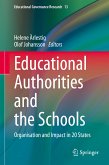Whilst they acknowledge the influence of cultural, policy, and community contexts, they are not oppressed by these. The chapters provide a brief description of country and school contexts, the life and work of the principal, their leadership strategies and how they contribute to teacher wellbeing and teaching quality, leadership development in others, pedagogical leadership, cultures of trust, and community engagement. There is also consideration of how school leaders manage tensions and dilemmas, how success differs from effectiveness, and the characteristics and qualities of leaders that lead to success. It is a book which will stimulate school leaders and aspiring school leaders to consider more deeply their own work and its directions. For researchers and system leaders, it provides multi-level, multiple perspective case studies as part of the largest international educational leadership project ever undertaken. It is a 'must read', rich, timely professionally connected book.
Dieser Download kann aus rechtlichen Gründen nur mit Rechnungsadresse in A, B, BG, CY, CZ, D, DK, EW, E, FIN, F, GR, HR, H, IRL, I, LT, L, LR, M, NL, PL, P, R, S, SLO, SK ausgeliefert werden.









